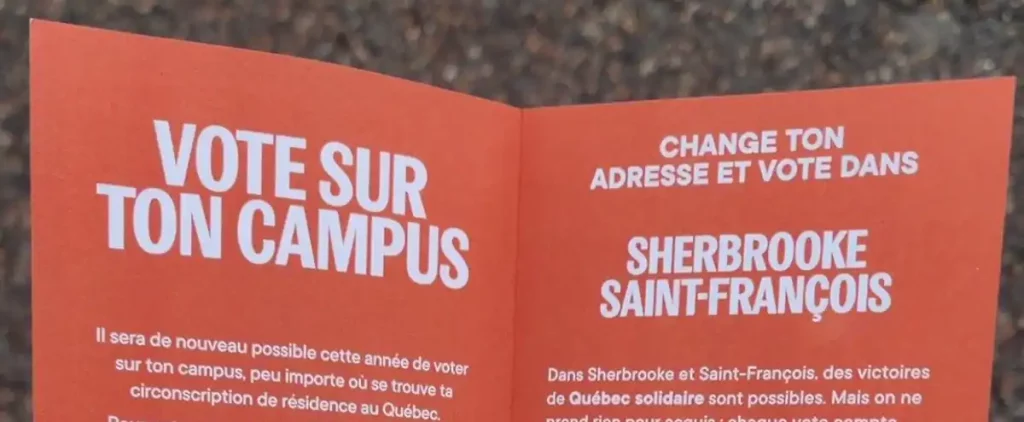
Quebec Solidaire withdrew a leaflet from the University of Sherbrooke inviting students to change their address to vote in two local ridings, where the party has hopes.
• Also Read: Quebec City Threatens to Seize Eric Duhaime’s Two Buildings for Unpaid Taxes
• Also Read: Propose an “Era of Change”: Will it pay off politically?
• Also Read: Singer Daniel Boucher supports the Parti Québécois
“Change your address and vote in Sherbrooke, Saint-François,” says an orange flyer distributed on the UdeS campus.
The party invited QS’s two local candidates, Christine Labrie and Melissa Genereux, to vote. “You can easily change your address while voting on your campus,” it claimed.
“You will have to show up at the polling places in your campus with photo ID proof and address proof (college bill, electricity bill, internet bill etc.) which will confirm that you are residing in your campus constituency. Change of address,” the flyer said.
It added: “Electoral law recognizes the right to vote where you principally reside”.
The party confirmed it had stopped distributing the pamphlet after negative feedback from Quebec’s chief electoral officer.
Voluntary withdrawal
“Despite a different explanation than the DGEQ’s counsel gave us about the election law, we have removed some of the flyers previously distributed on campuses, even though the DGEQ’s counsel never told us that we were in violation of the law,” the party said in a written statement.
“We did not want the hundreds of young people who participated in their campus for Quebec Solidaire to be at the center of a debate on the interpretation of the law and to be threatened with fines”, adds the training.
Without commenting on this specific incident, the DGEQ clarified its interpretation of the election law.
“Students often stay close to their place of study, but their home is always in their parents’ home, which may be in a different district than their campus. After that they will vote for the candidate from their residential constituency. This is the spirit of on-campus voting: to avoid students having to travel to their constituency to exercise their right to vote. Almost 80% of votes cast on campuses were counted in a constituency other than on campus during the 2014 and 2018 elections,” a spokesperson wrote.
“To apply for change of residence, the voter has to prove that he is actually living at another place and intends to make it his principal residence”, she adds.
Where does the student live?
But meeting a student at the University of Sherbrooke this week, minutes after Gabrielle Nadeau-Dubois arrived at her table, she stressed the importance of voting for a candidate in the riding she’s studying. After all, she may live there for three, five or more years.
“I want it to have an impact on my student life, where the elected party can shape my student life and my university career,” says young Molly, a direct supporter of QS.
In collaboration with Antoine Robitaille





More Stories
How List Acquisition Helps Your Political Campaign Become Successful
Four escaped cows were caught
A simple administrative decision? | Press